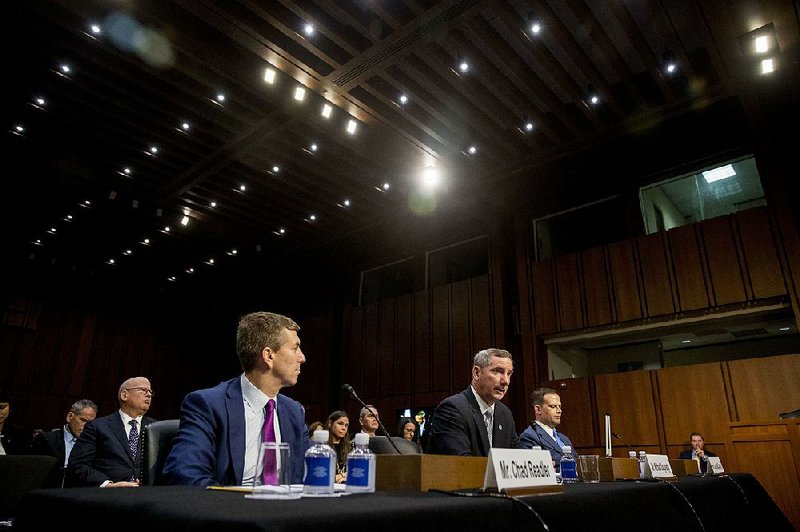WASHINGTON -- President Donald Trump denied making a deal with House Minority Leader Nancy Pelosi and Senate Minority Leader Charles Schumer to protect illegal immigrants brought to the U.S. as children, Republican lawmakers who dined with Trump at the White House said Tuesday.
And House Majority Leader Kevin McCarthy said the president agreed that any deal on those immigrants would happen only after Congress dispenses with tax overhaul legislation.
"Taxes first and then we could solve DACA," recounted McCarthy, who was among the small group of GOP lawmakers at Monday night's dinner.
DACA stands for Deferred Action for Childhood Arrivals, a program from President Barack Obama's administration that has provided temporary work permits and deportation relief to its approximately 800,000 participants.
[U.S. immigration: Data visualization of selected immigration statistics, U.S. border map]
Pelosi and Schumer had trumpeted an agreement with the president after emerging from their own White House dinner last month, saying he had agreed to codify existing deferred-action protections and to back a broader legislative solution that could cover about twice as many immigrants. But Republicans at Monday night's dinner said the president denied any such deal and made clear he was focused narrowly on a solution for DACA recipients.
"The president was very clear we're dealing with DACA," said McCarthy, R-Calif. "He was very clear the difference between Dreamers and DACA."
The term "Dreamer" is based on the never-passed DREAM Act, or Development, Relief, and Education for Alien Minors Act, which was introduced in 2001 and would have given protections similar to those provided by the deferred-action program.
Trump announced last month that he was ending the deferred-action program and giving Congress six months to come up with a fix. The president has suggested he could revisit the issue if Congress doesn't come up with a solution in time, but administration officials testifying Tuesday before the Senate Judiciary Committee said that immigrants' temporary work permits would begin to expire absent congressional action, and they would become subject to deportation.
[PRESIDENT TRUMP: Timeline, appointments, executive orders + guide to actions in first 200 days]
Pelosi and Schumer's claims of an agreement last month were contested at the time by Republican leaders who insisted that the White House had told them there was no deal. And McCarthy and Sen. Tom Cotton of Arkansas, who was also at the White House dinner, said the president and Chief of Staff John Kelly repeated the assurance to them in person.
"There's no deal. President Trump said there's no deal. John Kelly, who attended that dinner, said there's no deal," Cotton said. "So there has to be a negotiation that occurs, in the House, in the Senate."
Sen. John Cornyn of Texas, another attendee Monday night, said the White House would be sending legislative principles to Congress as soon as this week, although that's something White House officials have been promising for weeks. House Republicans have also convened a working group on the issue.
For his part, Schumer disputed the Republicans' assertions.
"If the president is changing his view, he should tell us," Schumer said. "I have talked to the president, I have talked to Gen. Kelly about continuing on the path that we all agreed to indisputably."
The back-and-forth came as senators convened their first hearing on the topic since Trump announced he was winding down the deferred-action program, which Republicans have long denounced as an unconstitutional overreach by Obama.
The fates of hundreds of thousands of immigrants, many in the country since infancy, hang in the balance. Dozens were present to hear senators of both parties pledge to work toward a solution, even while partisan divisions that could complicate any resolution were on stark display.
Michael Dougherty, an assistant secretary at the Department of Homeland Security, testified that Trump would like Congress to find a solution allowing the young immigrants to remain legally in the United States.
"They are a benefit to this country," Dougherty told the Senate Judiciary Committee. "They are a valuable contribution to our society."
"Under a rational bill these individuals would be allowed to become lawful permanent residents," Dougherty said.
Republicans insisted that any solution would need to be accompanied by stronger border security and enforcement measures. But Judiciary Chairman Charles Grassley specified that he didn't mean a "wall." Trump himself has suggested that his long-promised U.S.-Mexico border wall can be addressed separately from a solution for the deferred-action program participants.
Meanwhile, any deferred-action participants eligible to renew their two-year work permits must have their applications in by Thursday under the administration's timeline.
A Section on 10/04/2017
